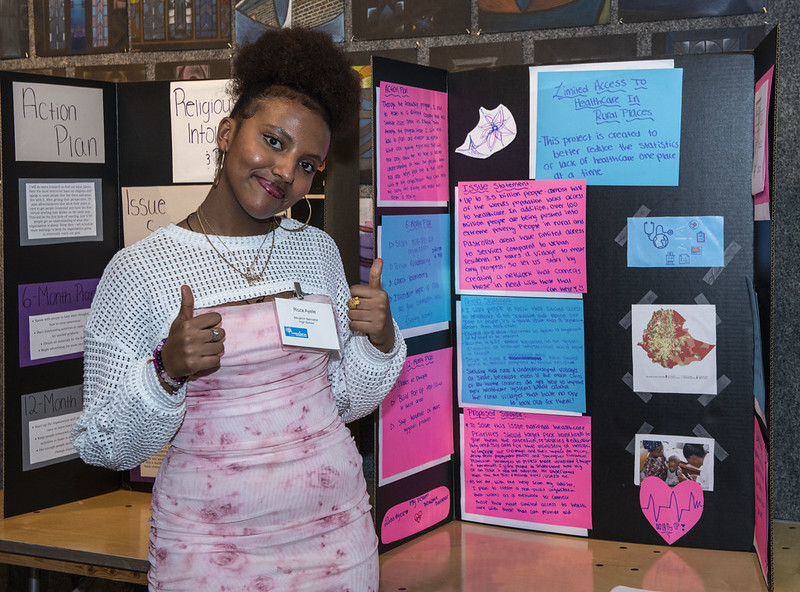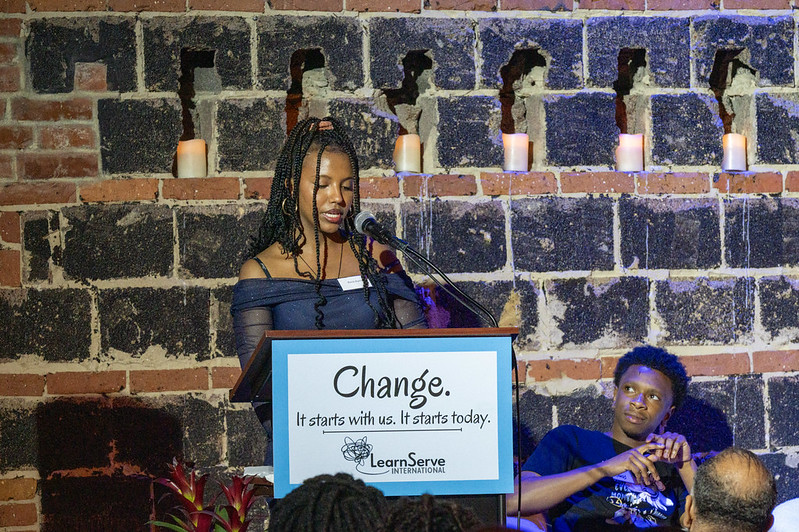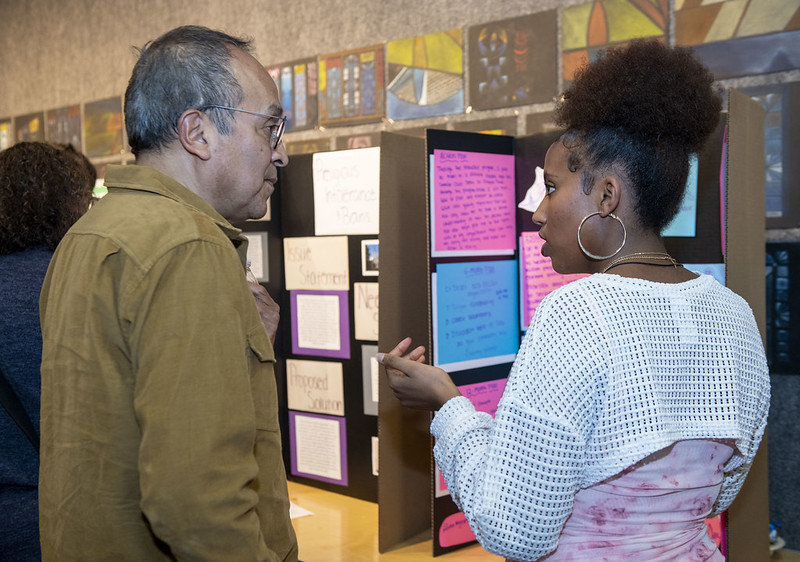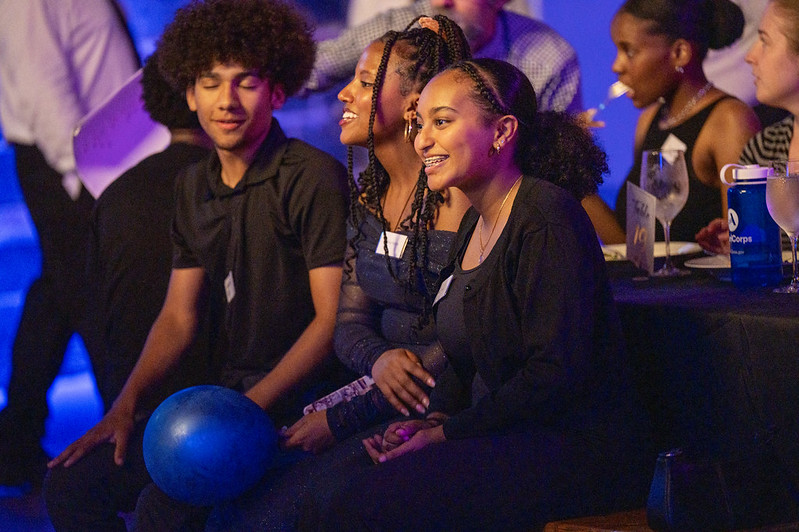“I believe this place truly helped me find out what I want to do in the future.”
Roza Ayele is a junior at Benjamin Banneker Academic High School, a graduate of DC Fellows ‘24, a current Incubator student, and also a student intern supporting our DC Fellows program.

During her Fellows year, Roza decided to embark on a project to improve healthcare access in rural communities of Ethiopia. Born and raised in Ethiopia until she was 10, Roza wanted to rectify healthcare disparities she saw in the country. Her ultimate vision for the venture is to create a pop-up clinic that distributes first aid kits, medical supplies, and health education in hard-to-reach communities.
As of now, Roza has created a Health Occupations Students of America (HOSA) chapter at her school to grow a community of changemakers. She’s delving into her venture through LearnServe’s Incubator this year to ultimately plan out an international trip to Ethiopia. We sat down for a conversation with Roza about her LearnServe journey:

How did you find out about LearnServe?
I found out about LearnServe through Dr. Nickelson, the AP/IB coordinator at my school. Dr. Nickelson reached out to me early in my sophomore year, and initially, it wasn’t really about LearnServe. He asked about where I was from – Ethiopia – my passions, goals, and what I wanted to do.
I told him I was interested in the medical field, and eventually mentioned that he had gone on an international trip with LearnServe. He knows Scott (LearnServe’s director).
I got in contact with Scott and joined LearnServe programs pretty late, near the end of November and the beginning of December.
At first, I didn’t really know what LearnServe was about. But, I knew Niya, a student in my school. Niya’s brothers had participated in LearnServe, so it was nice knowing someone familiar with the program.
Could you tell us a little bit about your venture?
My interest in the medical field started when I was young. I’ve always been encouraged to go to the medical field. Stereotypically, foreign parents know three careers: doctor, lawyer, and engineer.
I always had the medical field in the back of my mind, but I didn’t understand the reason why.
I was born and raised in Ethiopia and came here when I was 10, so I knew fully what living in Ethiopia was like and its many areas.
I remember that the year before I moved to the US, I had visited some family in the rural areas of Ethiopia. I remember one of my cousins, who was really young, being quite sick. At that time, I didn’t understand what was going on and was confused as to why my cousin wasn’t getting treated at a hospital.
My mom explained that it was difficult to access healthcare in rural areas. These places are very far off from the city, and you can’t even access some communities by road. The bus ride to visit our family there took us 8 hours, and the bus took us over rocks. It was also expensive to travel. Even though my family lived in the city, the only time I remember going to the hospital was for teeth problems, and I remember it being very expensive to treat.
When we came to the US, I noticed differences immediately. Even to register for school, we were required to get shots. It made me sad because people don’t get this treatment in other places.
As I grew up, I realized there’s a need to bring change in the world within the healthcare field. It’s not just Ethiopia or Africa. Wherever you go, there’s one or more people who lack access to healthcare, and there are healthcare disparities everywhere. As I live here, I can see even within my own family and such the way insurance costs marginalize people.
Healthcare is a necessity.
Ethiopia is where you were born and raised. As you developed this venture to send healthcare supplies and educational resources abroad, did you come across critics or self-doubts about whether an international project was the right choice?
I did think about local health equity. Some of people’s concerns were that “you shouldn’t think that big.”
I did tell myself, ”If I go big, maybe I will fall.” But, my mom has always told me to dream big. If you take one step and fall, you fall back to point zero. But, if I take 10 steps and fall, I’ll end up somewhere higher than where I started.
I feel like with every dream, people will question you and ask, “What makes you different?”
I sometimes doubt myself too. When people ask me what doctor I want to be, I don’t know yet! So they’re like, “How are you going to make a difference?” Well, I’m starting. I’m figuring it out.
Others have brought up that there’s other challenges in Ethiopia that I should consider, like violence or wars. Even people in Ethiopia will caution going to rural places for safety reasons, on top of access challenges.
But, I do hope things will change. Faith in humanity, you know?

You are now in our Incubator. What made you decide to continue on?
I stuck with Incubator because of what Dr. Nicholson told me: Go on LearnServe’s international programs (LearnServe Global).
Although I do want to start small with my venture, my main goal is to better the community that raised me, so I want to go international.
The second reason I am continuing on in the Incubator is to see how international travel is planned. My main goal in Summer 2026 is to basically plan out a trip to Ethiopia like LearnServe does in Zambia. I hope through my time in LearnServe that I’ll understand what the behind-the-scenes of international travel planning looks like and the logistics involved.
We are in Week 7 of Incubator. At this stage, how are you feeling, and how is this experience different than Fellows?
The main difference I feel from right now and from my time in Fellows is I’m already one step ahead in my process. I feel like I see what my goal is. In Fellows, the hardest part is finding what your venture is.
My vision is just clearer now. Now, I can be more proactive. During ChangeFest (LearnServe’s annual event where Fellows pitch their ventures), there were people who gave me hope and told me, “If you need help, let me know.” Now I just need to reach out to them and make those connections.
There’s still doubts in mind when I think about my project. I went into ChangeFest feeling super nervous. But seeing and hearing people at ChangeFest who are generally willing to help gives me a feeling that there are people supporting me and this idea.
And even when people expressed doubts or gave constructive feedback about my venture, it only made it more clear what my goals are.

You are also a student intern this year. Can you tell us what you’re hoping to get out of this year?
I’ve invited all my friends to join the Fellows program because I believe this place truly helped me find out what I want to do in the future.
What I hope to get out of this experience is just being able to tell those people and students who come here that I’ve gone through this too. You know, it gets really tough when you have tests coming up with school, but it’s truly, truly worth it to continue.
I want to be the person people can ask for help.
Do you have anything to add on about how LearnServe has shaped or refined your career aspirations?
LearnServe has made me more specific about who I want to be.
I never saw myself as an advocate. When you think about a doctor, they advocate for a patient. But, you don’t necessarily or automatically think about doctors advocating for society.
Now that I have my venture to improve healthcare access in rural places in Ethiopia, I can think of myself as an advocate. I also have this country that I’m advocating for.
My experience with LearnServe is also a reason I’m considering studying business or foreign affairs. Even though I still want to be a doctor, I am now interested in pursuing a major or minor in one of these fields. Previously I only imagined pre-med.
I recently came across a video of someone explaining how more girls should study business – because if we ever have an idea, we don’t want to leave its success in the hands of someone else.

What advice would you give to current Fellows?
#1: Don’t procrastinate about Changefest or Gala because it will catch up. Make sure that your venture relates to you or is personal to you. Having a personal connection makes it easier to answer questions because it’s something that you know about.
#2: Have fun in the process and be open minded to making friends. The friends I’ve made last year, we still talk. You’ll build a community you never expected to or friend groups you never thought you’d have. It’s a good community to be part of because they know what you’re going through. Being open to sharing your story helps people understand who you are as a person and where your values are at.
